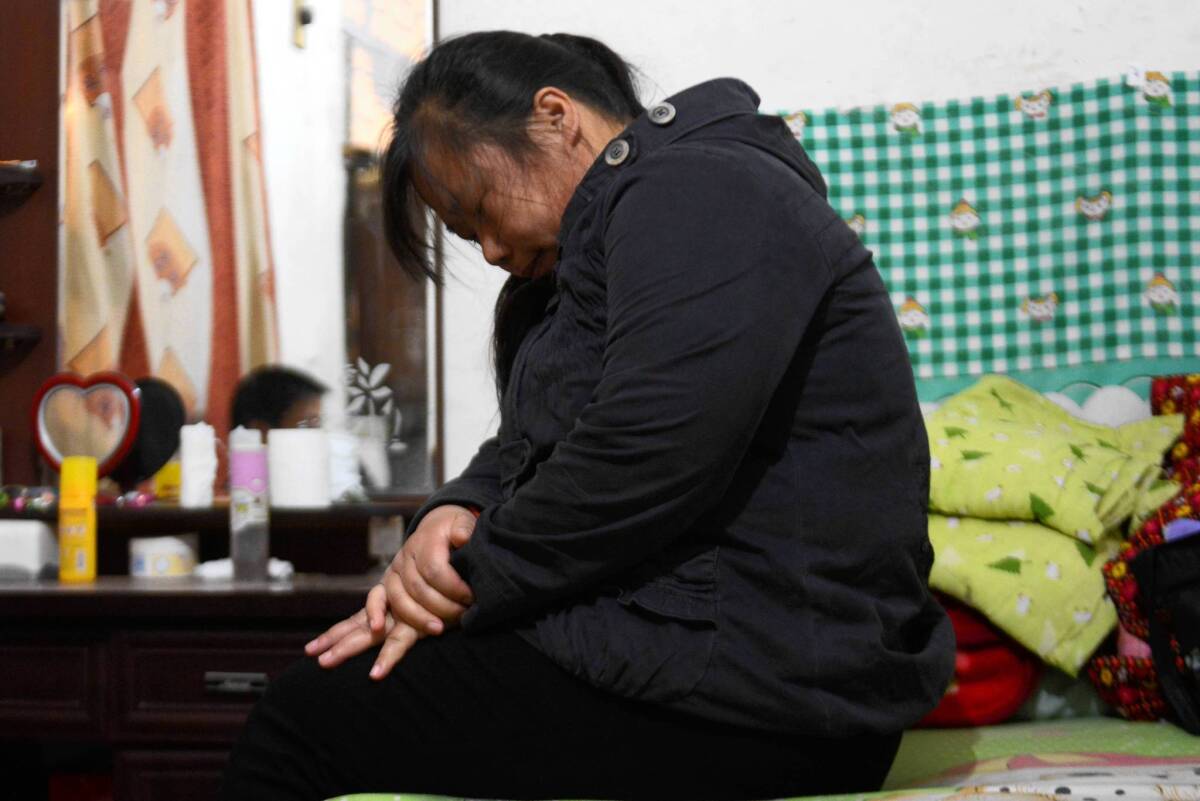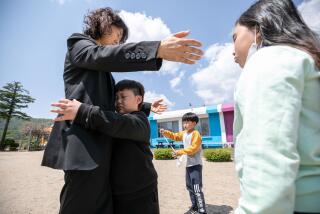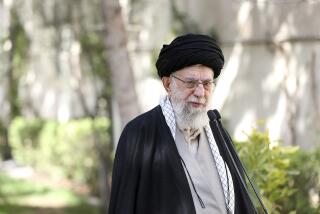In China, kindergarten rivalry takes deadly turn

- Share via
LIANGHE, China — When kindergarten was dismissed on that April afternoon, 6-year-old Ren Xinyi and her younger cousin hurried home. They were eager to check out a plastic bag they had spotted on the way to school that morning with their grandmother, who had taken it home without thinking twice.
Xinyi looked inside and grabbed a blue pencil and notebook; 5-year-old Ren Zhaoning took out a children’s yogurt drink and sipped half of the creamy white liquid before handing it to her cousin. By nightfall, Zhaoning was dead. Xinyi, who drank less, would succumb six days later. As it turned out, the drink had been laced with rat poison.
Even more shocking than the fact that the poisoning was deliberate was the identity of one of the perpetrators. Two people were arrested and later confessed. One was the principal of a rival private kindergarten. She was apparently intent on hurting the reputation of its bigger, more profitable rival, according to the official New China News Agency.
Though extreme, the tragedy in this remote corner in Hebei province draws attention to the intense, sometimes-brutal competition among private, profit-driven kindergartens across China. Such schools have mushroomed in recent years amid rising demand and awareness of the benefits of early education.
The overwhelming majority of kindergartens in China are private and unlicensed, which is illegal, but officials rarely enforce licensing rules. That’s especially so in rural areas, where qualified teachers are scarce compared with urban centers in which many of the kindergartens are public and government-funded.
Competing for students, private kindergarten owners and staff members have been known to engage in smear campaigns and physical brawls. Some have used buses to block one another’s way.
“They know kindergarten students mean money,” said Yang Dongping, an education authority at Beijing Institute of Technology. In the capital, he said, private kindergartens charge an average of $500 a month per child. Those in poor villages like Lianghe charge a fraction of that, but can still make handsome profits if they recruit enough students.
Nationwide, more than 16,000 kindergarten schools opened in 2011, a 10% increase from 2010, according to the latest statistics from the Chinese Assn. for Non-Government Education. Of those schools, about 80% were private, receiving no government funding. The others, public kindergartens, were established in urban centers and are better-funded, licensed and much more likely to have highly trained teachers.
Education scholars say the Chinese government recently has taken more interest in preschool education, and three years ago issued a plan to increase the number of public kindergartens, though not at the village level.
“In the past, only urban children went into kindergarten,” said Wang Feng, a population expert and director of the Brookings-Tsinghua Center for Public Policy in Beijing. The rural trend is developing because of a higher standard of living, greater awareness and stiff competition to get into good elementary schools.
Lianghe, population about 2,000, is unusual in that it had two kindergartens, both private. Lianghe Central was the larger and more established. Village leaders opened it in 2007, but it was quickly converted to private ownership. At the time of the poisoning, the school’s enrollment was 217, according to the Education Bureau of Pingshan county.
Half a mile from Lianghe Central, along a polluted river and a row of discolored dwellings, stands the Pingan Kindergarten, which was started in March 2012 by Shi Haixia, a onetime farmer in this village.
Unlike Lianghe Central, Pingan has no outdoor playground or gate in the front. At last count, Pingan had 56 pupils.
Lianghe Central and Pingan charged the same tuition: about $16.25 a month, with an extra 16 cents during the winter for heating costs. That low tuition represents one-sixth of a Lianghe farmer’s average monthly income.
Neither school operated with a license or qualified teachers, unbeknown to most villagers. Families were happy to have a preschool nearby, a convenience that couldn’t be said for many other villages.
Many of the parents in Lianghe, like Zhaoning’s, had jobs in Pingshan county, a good 10 miles away. Some commuted farther to Hebei’s capital, Shijiazhuang, where Xinyi’s mother, a single parent, worked at a law firm.
Having a kindergarten nearby meant that elderly villagers, who, like many across China, typically take care of young grandchildren, could be free from 8 a.m. to 4:30 p.m. to rest, farm or tend to other matters. As many saw it, kindergarten was a convenient daycare center, and if the children learned something, all the better.
Ma Xinping, principal of Lianghe Central Kindergarten, told China’s CCTV recently that none of the school’s seven teachers were certified. Ma said that she was the most qualified educator on the staff, having earned a high-school diploma.
“We don’t care about those extra things” such as licenses, said Zou Lingshu, an illiterate 65-year-old who looks after her grandson, Liu Menda, 6, who was a student at Lianghe Central.
After the poisonings, Pingan was shut down and Lianghe Central was temporarily closed. With classes canceled on a recent Thursday morning, Zou was lingering in a concrete lot in front of the school, her gap-toothed grandchild tugging at her arms.
The Education Bureau at Pingshan county, which has jurisdiction over Lianghe and 22 other villages, said no one was available to answer questions about the poisoning case. An official at the bureau said all of its workers were out conducting school inspections. He instead provided a copy of a statement saying the bureau had acted promptly to shut down the Pingan Kindergarten and notify parents that children should be careful not to eat food from strangers, among other precautions.
Local officials have been particularly sensitive to outside inquiries. Propaganda Bureau agents from Pingshan county closely tailed this reporter and his assistant, on foot and by car, during a visit to Lianghe. They refused to answer questions, and residents of Lianghe, including the families of the poisoned children, have been pressured to keep quiet.
“Once you are here, it will make things messier,” said Li Zhixia, mother of Zhaoning, the 5-year-old who died on the way to a hospital.
“We have a lot to deal with. Grandmother is not feeling well,” she added before hanging up the phone.
But for Li and other people in Lianghe, there is no masking their grief over the deaths of the two little girls.
“I’m sick to my stomach, I can’t even eat,” said a Lianghe Central teacher, who declined to give her name. She said she started recently at the school and that her salary was about $195 a month.
Two doors down from the Pingan Kindergarten, Liu Mingshu, 54, was looking after Liu Jiahan, her 5-year-old granddaughter. Jiahan was a pupil at the now-shuttered Pingan, where even the signs have been removed.
The grandmother said she was working on her family’s peanut farm April 24 when she heard the roar of sirens. It was the sound of an ambulance that had come for Zhaoning. A few days later, Liu would hear the wailing of the two girls’ grandfather.
Liu said she didn’t know that Pingan had been competing for students; all she knew was that the teachers at Pingan would warmly welcome her granddaughter.
But others in town reported that staffers from Pingan previously had been accused of smashing windows at Lianghe Central. Afterward, Lianghe installed surveillance cameras, one of which captured the Pingan principal’s apparent accomplice placing the bag with the poisonous drink on the road.
“I could never imagine this would happen,” said Liu, who had been a neighbor of the two children. “Those two kids were very cute. They really loved dancing. They were well-behaved and good-looking. I’m sure they would have been beautiful grown up.”
Nicole Liu in The Times’ Beijing bureau contributed to this report.
More to Read
Sign up for Essential California
The most important California stories and recommendations in your inbox every morning.
You may occasionally receive promotional content from the Los Angeles Times.













